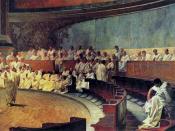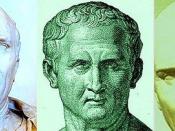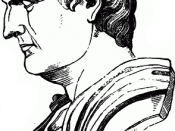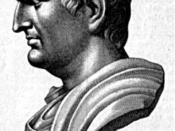In Cicero's, "First Philippic against Marcus Antonius," he is offering his view on the political situation after the death of Caesar. His purpose for coming before the Senate is to drive them to the realization that Marcus Antonius and his actions are slowly breaking down the unity of the country. He praises Marcus Antonius for his fine speech, intentions, and promises, then points out the fallacies and unconstitutionality of Marcus Antonius' actions. He reminds the Senators that "Nothing was done any longer through the Senateâ¦" because measures were being passed without declaration or consent. The Senate and Caesar's advisors are Cicero's audience even though the end of the speech is directed towards Marcus Antonius and Dolabella who are not present. Cicero describes his motives of leaving and coming back, Rome's problems, the need for Caesar's laws, and the contingency of some of Marcus Antonius' laws, making the reader think that he is trying to sway the Senate into rebelling against Marcus Antonius yet at the same time he praises and congratulates the good deeds done by him.
Even at the end, he addresses Marcus Antonius who is not even present, acclaiming and chastising. Why does he do this? Cicero makes a valiant, determined attempt to convince the Senate to join powers with him against Marcus Antonius yet at the same time, does he have doubts or fears about speaking against Antonius otherwise why would he be so propitious in his approach? Cicero starts the speech with a direct address towards the Senators. This establishes who his audience is. Throughout the speech his tone is one of persuasion. His first goal, in giving this speech, is to persuade the Senators that his view and opinions are legitimate by proving his credibility. He shows his concern for justice by stressing what he has done to serve the country and giving a testimony of devotion. "I made no journeysâ¦I did all that was within my power to lay the foundations of peace. I reminded members of the ancient precedent created by the Athenians making use of my orationâ¦and I moved that every memory of our internal discords should be effaced in everlasting oblivion." He assures the Senate that he is a dedicated consul and Senator with only good intentions. He establishes his credibility.
In the next section of the speech, Cicero commends Antonius on handling the issues of the country well, since he did invite political leaders to attend a consultation session on the nation situation at his home, and for answering questions directly. "Were any exiles recalled? Oneâ¦Were any tax-exemptions granted? None." At this point, the Senate can agree with Cicero's contentment because Marcus Antonius has done many admirable deeds. But after this remark, Cicero's tone changes. "So determined was his action that I am amazed by the contrast between that day and all the others which have followed." He points out the days when Marcus Antonius deeds were just and great and then there is a sudden transformation, a dramatic mood or tone change.
Cicero continues to confirm his credibility because his speech cannot be effective without the Senate being convinced that he has only good intentions at heart. He states the circumstances that prompted his departure. He explains that "Nothing was any longer done through the Senate, many significant measure were passed through the Assembly of the peopleâ¦without even consulting the Assembly, and against its wishes. The consuls elect declared they did not dare come into the Senate at all. The liberatorsâ¦were excluded from the very city which they had rescued from servitudeâ¦" Cicero felt that "it was less disagreeable to learn of these things that to see themâ¦" so he left. He could not stand to see this happen so he takes up the opportunity to travel, an honorary mission (legatio libera.) He earns credibility here because he uses Pathos to get them to understand his positions and emotions. They are able to sympathize with Cicero.
He goes on to explain the reason for his return. When he had left, he had a date that he would return in mind, January 1st. Shortly after his arrival in Greece, he heard news of "a well-attended meeting of the Senate on the first of August and that Antonius was going to drop his bad advisers, renounce his governorship of the Gallic provinces, and resume his allegiance to the authority of the Senate." He makes is clear that he was eager to return so that he could witness such a great day. He describes his enthusiasm, "no winds were speedy enough to satisfy my impatienceâ¦I was eager not to waste a moment in offering the government my congratulations." And on his way home, he hears about Piso's great speech and the lack of support that he received. Cicero tells the Senate that this gave him even more reason to return. "â¦I hastened back to lend him my aid. My purpose was not so much to accomplish anything concreteâ¦this is a time when many things contrary to the order of nature and even against the ordinary course of fate seem likely to happen at any moment." Cicero was eager to come back, but he did not know what to expect when he did. He just felt like this was one of those "moments of truth," where things could start to look up or take a drastic turn for the worse. He shows that his return was a search for peace and tranquility. He presents his sincerity in wanting justice and order.
Up to this point, Cicero has praised Marcus Antonius for a job well-done, established his credibility, explained his reasons for leaving and returning, and proved his devotion to his country's welfare. Now that he has the Senate sympathizing with him and listening, he decides to go in for the kill. He tells the Senate about Antonius' disrespectful, unfair actions. Cicero tells them he considered Antonius as a friend yet friends do not penalize each other by sending an order to demolish a residence just because one can not attend a meeting. Antonius was crude enough to threaten his friend for not attending a Senate meeting where his attendance was unnecessary. Cicero ends the story by saying that "allâ¦can do about yesterday's decree is entreat the gods to pardon the people of Rome, who in any case do not like the measure-and to pardon the Senate that only passed it with reluctance." He is implanting doubts, worries, and thoughts into the minds of the Senators. He wants them to realize that the law only passed by force. What kind of democracy is that? In that case, can not every bill that Antonius favors be passed? Cicero uses logos to make the Senate realize their lack of good-judgement, speaking out, and strength. They were also weak when they did not show support for Piso. Slowly the Senate realizes that their role as puppets and "voluntary slaves" is wrong and that this is no way to achieve a democracy.
Now, the Senate doubts Antonius. Is he misusing his power? Cicero is "permitted to offer (his) observationsâ¦" and "â¦fight in defense of (his) own positionâ¦" He discusses Caesar's laws and how he believes "the acts of Caesar ought to be retainedâ¦because (he) attaches supreme importance to peace and tranquility." Cicero knows that the Senators are content with the death of Cicero, yet he speaks out about letting the laws set by Caesar from dying. All that was created by Caesar must not go. The laws that were declared and supported by the people should be kept. Otherwise, how will the country maintain order especially with laws that are being made, by Marcus Antonius, without the public knowing and the Senate consenting to it? Marcus Antonius' acts are nothing but things "jotted down in scrappy memoranda and handwritten scrawls and notebooks" unlike Caesar's acts which he himself "engraved on brass tablets with the intention of preserving the national Assembly's directions and definitive laws." Compared to this, how can we disregard such acts? Cicero is using this juxtaposition to make the Senators distinguish what is good for the nation. He points out that Caesar's laws are those that are set in stone. They are declared laws, like promises, which must be kept. Some of the laws may not be fair, like the funds collected in the Temple of Ops, but they must "put up with its dissipation-if it is a fact that this is what his acts laid down. The laws made by Caesar were made for good reason and with the interest of the nation in mind. Cicero knows that the Senate was not happy with all of Caesar's rules. That is why he points out that the laws passed by legislation are the only ones they must regard. Those ideas and rule written in the notebook of Caesar are nothing more than that whereas Marcus Antonius is trying to pass every little scribble written on a scrap of paper as a piece of legislation. Cicero also points out the misperception that former soldiers of the Legion of the Lark would uphold the position on the third panel justly is far from the truth. He tells the Senate that the thought of former soldiers producing impartial verdicts is a "miscalculation." Cicero is trying to convince the Senate that Marcus Antonius' bill are unnecessary, ineffective, and unpopular. He shows them the idiocy in passing these laws that will only suppress the people, which will lead in a revolt and no one wants that. Cicero uses his knowledge of what government fears most, revolt, to show the Senate that Marcus Antonius' action will lead to that result, not that Caesar was perfect or anything. Caesar had his faults but his laws must be maintained for unity's sake.
Cicero also points out that the secrecy of Marcus Antonius' passing of legislation will cause people to resist and rebel. "When laws are publicly announced, as those were, at least we are afforded a chance to complain if we want to. But when we merely have to reply on hearsay to discover that a law has been passed at all, no such opportunity exists." Caesar made his laws public to get a sense of approval or disapproval. If Marcus Antonius continues to pass laws behind the backs of the people, the public will feel that their right to be involved in how the government serves them is being alienated. Marcus Antonius lacks the knowledge of how important foundation is for a country.
Cicero admits that Caesar's way of running the government was not perfect but that it kept the peace and Caesar did have the interests of the people at heart. Whereas, Antonius is not fit to run the government because he is unaware of what are "institutions fundamental to the security of the state." He passes laws without the consent of the Senate, without the approval of the people, and without the thoughts of consequences in mind. The Senate may have been so displeased with Caesar that they never took a second glance at the mistakes being made by Marcus Antonius. Cicero warns the Senate of the tragic outcome that will follow if Marcus Antonius proceeds with his ways. At this point, the Senate can see the weakness of Marcus Antonius and how he is wronging the citizens as well as the Senate. Disapproval is crossing the minds of the Senate.
Finally, Cicero addresses Marcus Antonius by name even though he is not physically present. This shows that Cicero's audience has changed and just as he did with the Senate, he will first flatter then criticize. He knows that if he just comes out with all the criticism, it will seem like a personal attack. But if he first establishes his appreciation for what Marcus Antonius has achieved, and then points out his faults, it will seem nothing more than constructive criticism. "I have never found anything squalid or mean in your character." At the beginning he praises Marcus Antonius for his "splendid speech made about national unity!" but then chastises Antonius him for being "corrupted by financial considerations." Cicero's words are a rollercoaster. He puts Cicero on a pedestal and then knocks him down. He expresses the expectations that he held for Marcus Antonius and how his hopes were crushed by disappointment.
Throughout the speech, whether Cicero was addressing the Senate or Marcus Antonius, he uses this rhetorical device to gather the sympathies of the Senate. They too had expectations and realize that Caesar has fallen short of them. Cicero cleverly uses the absence of Marcus Antonius to persuade the Senate that this is not a personal attack but a speech of concern and an expression of disappointment. He was careful on how to capture the emotions of the Senate and made sure that they believed that he was judging Antonius fairly with the concerns of the public at heart.
Cicero successfully completes his speech. He establishes credibility with his audience by proving his loyalty to the country, concern for their welfare, and criticisms were not personal. He gives Marcus Antonius credit for the duties well done but makes sure that his faults stand out. He states his concerns, opinions, and reproaches calmly without making it seem like he is condemning Marcus Antonius. If had taken a more aggressive tone, the Senate would have seen his attack as personal and discreditable. Cicero strategically talks about the rights of the people being violated which plays on the fears of the Senators as well since they too are part of the citizenry. Cicero's aim is to convince the Senate as you would a jury. He must establish credibility therefore, state his concern, followed by reason, and then opinions and reactions. He walks the Senate through his thoughts and justifies his reason for judging Marcus Antonius. He also uses Dolabella to show that he is fair when judging a person. He was not harsh with Dolabella. He was compassionate and understanding. "You are my intimate friend Dolabella; and when I see you sitting there, heaven knows I find it impossible to keep silent about the mistake that you are both making." Cicero's tactics are guileful and well planned.
Cicero's "First Philippic against Marcus Antonius" is directed towards the Senate. It that he gave this speech, in order to sway the Senate into taking sides with him. His tactics were specially intended for the Senate. He used pathos to gain their sympathy, and played on their fears to get them to see his concern (ethos). He did at the end seem to "kiss ass" but it was not because he feared death. He speaks boldly to the Senate as if he is holding nothing back. He never once says that he may regret speaking so openly. The reason why he "kisses ass" is because it is part of his technique. Even at the end, after all is said and done, Cicero addresses the Senators again, "Senators, the rewards I hoped to gain from my return are now mine. For the views I have expressed to you today re guarantee that, whatever may happen in the future, my determination shall be on record." Cicero has planted the thought of doubt and disappointment in the minds of the Senators and he "nails the coffin shut" by putting in a remark that says, "You've been warned, so when it happens, I can say that I told you so."





